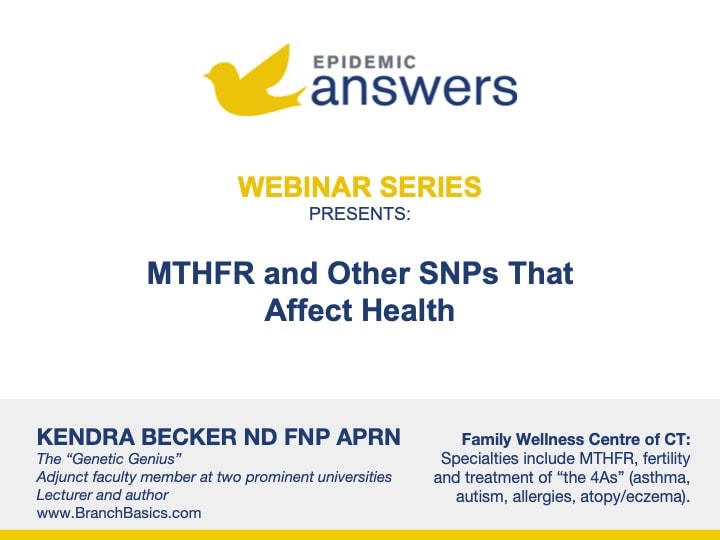A genetic mutation called MethyleneTetraHydroFolate Reductase, otherwise known as an MTHFR mutation or methylation defect, may be one reason why some children develop autism or other neurodevelopmental disorder. There are many contributing factors involved in this “perfect storm” situation which may accurately describe your child.
The MTHFR mutation may explain why some children survive the overload of environmental toxicity whatever the triggers may be, whereas others, at some point during their early stages of neurological development, regress and remain somewhere on the vast spectrum of neurodevelopmental disorders.
MTHFR is a type of folate that crosses the blood brain barrier (folic acid, which is synthetic, does not) needed to make the brain methylate; put simply, methylation is a method of detoxification. Children with autism have been found to have Cerebral Folate Deficiency (CFD) which means an insufficiency of folate in the brain causing defects in the methylation process.
What Is Methylation?
Defects in the methylation process can affect:
- Speech
- Language
- Auditory processing
- Reading comprehension
- Focus
- Concentration
- Socialization
- DNA repair
- Homocysteine levels
- Inflammation
- Recycling of key antioxidants
- Increase of sulfation for the excretion of heavy metals and elimination of allergies (environmental and immune)
- Improved production of glutathione, the master antioxidant that excretes environmental toxins and pathogens out of the body
Having normal levels of glutathione enables the body to excrete the environmental toxins efficiently.
MTHFR and Autism
Studies have shown that 98% of children with autism have the MTHFR genetic mutation defect; however, the mutation is not exclusive to autism. Families that are susceptible to autoimmune disorders are also associated with the MTHFR anomaly.
There are two prime variants called C677T and A1298C. Some children have one copy of one variant of the MTHFR, and some have both copies. The C677T variant is usually associated with heart disease and stroke because of the conversion of homocysteine to methionine. Many children with autism are unable to make this conversion, which is why they are such poor methylators.
The A1298C variant, on the other hand, is associated with chronic illnesses and many children with autism do suffer chronic illnesses associated with this disorder. Therefore, critical immune functions may be compromised if there are any defects found in the methylation process.
Testing
Labcorp offers a blood test to determine both mutations of MTHFR, and there are other labs that test for the mutation as well. However, Amy Yasko PhD, ND has done extensive research on methylation and has a Nutrigenomic Test which identifies 30 different genetic mutations in the body including the MTHFR. Some of the genetic mutations have to do with the neurotransmitters dopamine and serotonin, while others are concerning sulfation and pathways that generate ammonia – all critical issues for children with autism.
It is also very important to know that lithium is a crucial mineral that transports folate and methylcobolamin (methyl-B12) into the brain which is essential for healthy methylation.
Kendall Stewart MD at Neuro Sensory Centers has formulated a very effective transdermal cream called Neuro Immune Stabilizer Topical Cream by Neurobiologix which is easy to use with your child. In addition, have your physician do the appropriate testing and suggest the appropriate nutritional supplementation to support the methylation process and MTHFR for your child.
Still Looking for Answers?
Visit the Epidemic Answers Practitioner Directory to find a practitioner near you.
Join us inside our online membership community for parents, Healing Together, where you’ll find even more healing resources, expert guidance, and a community to support you every step of your child’s healing journey.
Sources & References
Arnold, P.A., et al. Glutamate transporter gene SLC1A1 associated with obsessive-compulsive disorder. Arch Gen Psychiatry. 2006 Jul;63(7):769-76.
Bidwell, L.C., et al. Genetic influences on ADHD symptom dimensions: Examination of a priori candidates, gene-based tests, genome-wide variation, and SNP heritability. Am J Med Genet B Neuropsychiatr Genet. 2017 Jun;174(4):458-466.
Bowers, K., et al. Glutathione pathway gene variation and risk of autism spectrum disorders. J Neurodev Disord. 2011 Jun;3(2):132-43.
Esmaiel, N.N., et al. The potential impact of COMT gene variants on dopamine regulation and phenotypic traits of ASD patients. Behav Brain Res. 2020 Jan 27;378:112272.
Hausman-Cohen, S., et al. Utilizing Genomically Targeted Molecular Data to Improve Patient-Specific Outcomes in Autism Spectrum Disorder. Int J Mol Sci. 2022 Feb 16;23(4):2167.
Hausman-Cohen, S.R., et al. Genomics of Detoxification: How Genomics can be Used for Targeting Potential Intervention and Prevention Strategies Including Nutrition for Environmentally Acquired Illness. J Am Coll Nutr. 2020 Feb;39(2):94-102.
Hwang, I.W., et al. Association of Monoamine Oxidase A (MAOA) Gene uVNTR and rs6323 Polymorphisms with Attention Deficit and Hyperactivity Disorder in Korean Children. Medicina (Kaunas). 2018 May 18;54(3):32.
Li, Y., et al. Association between MTHFR C677T/A1298C and susceptibility to autism spectrum disorders: a meta-analysis. BMC Pediatrics. 2020(20)449.
Meng, X., et al. Association between MTHFR (677C>T and 1298A>C) polymorphisms and psychiatric disorder: A meta-analysis. PLoS One. 2022 Jul 14;17(7):e0271170.
Rahbar, M.H., et al. Detoxification Role of Metabolic Glutathione S-Transferase (GST) Genes in Blood Lead Concentrations of Jamaican Children with and without Autism Spectrum Disorder. Genes (Basel). 2022 May 29;13(6):975.
Sadeghiyeh. T., et al. Association of MTHFR 677C > T and 1298A > C polymorphisms with susceptibility to attention deficit and hyperactivity disorder. Fetal Pediatr Pathol. 2020 Oct;39(5):422-429.
Way, H., et al. Genomics as a Clinical Decision Support Tool: Successful Proof of Concept for Improved ASD Outcomes. J Pers Med. 2021 Jun 24;11(7):596.
Resources
Books
Lynch, Ben. Dirty Genes: A Breakthrough Program to Treat the Root Cause of Illness and Optimize Your Health. HarperOne, 2020.
Walsh, William J. Nutrient Power: Heal Your Biochemistry and Heal Your Brain. SkyHorse, 2014.
Yasko, Amy. Feel Good Nutrigenomics. Neurological Research Institute, 2014.




